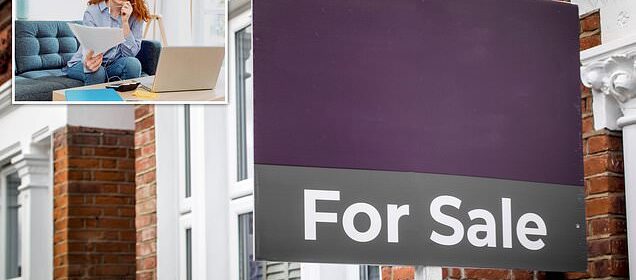WFH could cause 10% plunge in house prices, warns OBR economist

WFH could cause 10% plunge in house prices… and the effects could be ‘permanent’, warns OBR economist
- Top OBR executive David Miles says house prices will be ten percent lower
- This is due to the impact of working from home driving prices down in cities
Working from home could lead to a permanent 10 percent drop in house prices, according to a leading economist at the Office for Budget Responsibility (OBR).
One of three members of the OBR’s executive team, David Miles has said working from home will bring about a ‘permanent’ change in the house market as increasing numbers of Brits look to move away from city centres and into the countryside.
This will push up prices in rural areas, but lead to a massive drop in cities such as London, he has warned.
According to his own research, any increase in price in rural areas will not be enough to compensate for the drop in major towns and cities, leaving the market around 10 percent depressed overall.
More and more Brits will move away from city centres and into the countryside, David Miles of the OBR predicts
He says the pandemic has caused a ‘permanent’ shift in the housing market and the way the UK works
The Imperial College London professor also said the age of large house price rises is coming to an end as interest rates are set to rise instead.
Mr Miles told the Telegraph: ‘There’s much greater ability for people to work quite effectively from home – more than anybody really thought likely before Covid.
‘That looks like it’s going to cause a permanent change in the flexibility that people have about where they work and how far they need to live from their place of employment.
‘That’s a positive in terms of affordability because it obviously opens up the prospect of people being able to live further away from urban centres where house prices are cheaper, something which might not be feasible if you needed to go into work every day.’
He predicts this ten percent drop, compared to what prices would be without the impact of homeworking, will take effect within three to four years.
It comes as Chancellor Jeremy Hunt warned last month that working from home can hit ‘creativity’ as he insisted going into the office should be the ‘default’ option.
The Chancellor acknowledged video conferencing and other remote tools offer some ‘exciting opportunities’ including being able to ‘stay in touch’ with work while looking after a baby.
But he said he ‘worried’ that firms were losing out through staff not being able to ‘bounce ideas off each other’ – suggesting people should be in the office unless there was a ‘good reason’.
Source: Read Full Article


